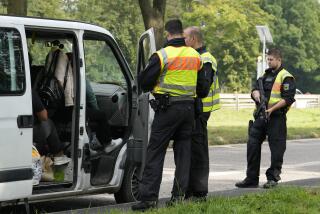One Europe: The Dream of Unity : Changing Lifestyles : A System Bordering on Chaos : Free movement between countries may open the door to crime and terrorism.
- Share via
PARIS — When internal borders dissolve at the end of this year, the 1987 Single European Act calls for the free movement of “goods, services, capital and people” in the 12 states that form the European Community.
In the categories of goods, services and capital this European dream seems well on track to meeting the 1993 deadline. But in the fourth, potentially most troublesome category, the one involving people, the Europeans have made relatively little progress.
Everyone agrees that the dream of a Europe without borders can succeed only if the EC’s 344 million citizens are able to move freely among member countries. But many are also afraid of the consequences of removing the community’s extensive and longstanding border controls.
Former British Foreign Secretary Ernest Bevin, a fervent advocate of a united Europe, said as long ago as 1951 that his dream was to be able to one day buy a train ticket in London’s Victoria station and travel anywhere in Europe without going through border controls, noted authors Nicholas Colchester and David Buchan in their book “Europe Relaunched.”
More than 40 years later, as Europe enters the home stretch of its “EC ‘92” effort, “it would be totally ludicrous to have goods, services and capital circulating but still have systematic controls on people,” said an EC official in Brussels.
Yet the traditional European system of border controls--customs, immigration and border police--forms an important part of crime control on the Continent. Police officials fear that dropping the borders without replacing them with some other system of internal controls will leave Europe’s door open for illegal immigrants and criminals of all types.
Despite a push by Germany to create a pan-European police force called Europol, the EC leaders meeting in the Dutch city of Maastricht in December managed only a weak agreement to share certain crime-related intelligence. So far, “Europol” is nothing more than a name-- although Lyon, France, Wiesbaden, Germany, and Rome have been proposed as potential headquarters for its nonexistent staff.
Nonetheless, the need for some kind of pan-European police force is generally recognized. European interior ministers have met since 1975 to coordinate efforts against organized crime, terrorism and drug smuggling. German Chancellor Helmut Kohl first proposed what he called a “European FBI” as early as 1988. But the willingness of European states to reduce sovereignty on police matters is tangled in historical suspicions, many inspired by World War II, when Germany’s free-ranging Gestapo was the terror of the Continent.
“I personally think that the fact that Europol was a German proposal made it difficult for other countries,” said a German government official. “When it comes to areas involving security, many countries fear Germany because of the last war. We understand that. It would have been better if the Europol proposal had been made by France or Italy.”
Without internal borders, the community’s ability to control illegal immigration, organized international crime, terrorism and drugs will be greatly limited. In Germany alone, for example, authorities stationed at borders with France, Belgium, Luxembourg and the Netherlands--all EC members--made 23,000 arrests and confiscated nearly three tons of drugs in 1990, the last year for which statistics are available.
What concerns some European national police officials such as Juergen Storbeck, chief of international relations for the German federal police in Bonn, is that after the borders are removed police will lose one of their most effective means of controlling crime.
“Until now,” Storbeck said in a telephone interview, “our borders have had great importance for police. The borders are the main places that we make seizures of drugs--heroin, cocaine and cannabis. They are where we intercept stolen goods and capture wanted persons.”
The united, borderless Europe of the future, said Storbeck, will be only as secure as its weakest point on its external border, from the Greek Island of Rhodes to the coast of Northern Ireland. “The moment a person enters into the community, no matter where, there won’t be any more risk,” said Storbeck. “So naturally the criminal will try to enter by the weakest point.”
To beef up external borders, the 10 continental members of the EC are expected to transfer most of their internal immigration, customs and border police officials to the external frontiers.
All seaports will be considered external borders and will have full customs and immigration facilities. Even the channel tunnel that connects Britain and France will be controlled as an exterior seaport even though both countries served by the tunnel are members of the EC.
Internally, however, the European Commission in Brussels has no say in police matters. Instead of working directly through the EC offices, the community has steered its pan-European police organizing efforts through two independent multilateral forums, the eight-nation group formed under the 1985 Schengen Agreement (all the EC countries except for Britain, Ireland, Greece and Denmark) and the 12-nation Trevi Group, formed in 1975, and comprising all the EC countries.
The Schengen group was formed by France, Germany, Belgium, Luxembourg and the Netherlands at a meeting in the Luxembourg village that gave the agreement its name. The original five were joined later by Italy and more recently by Spain and Portugal. The goal of the group was to abolish all border controls among them by the year 1990--a deadline that was not met, partly because the process was interrupted by the unexpected reunification of Germany and the strains it put on German border controls.
Another objective of the Schengen countries was to establish standard rules for “hot pursuit” between member countries. In theory, the rules would permit police officers to pursue suspects 10 kilometers (six miles) into a neighboring Schengen-member state.
So far, however, the negotiators have failed to come up with a standard procedure. France, for example, agreed to allow German officers to chase suspects but not to make arrests once they were in French territory. “Between Germany and France there is one rule,” said a German official. “Between Germany and Luxembourg there’s another. No policeman can keep up with all these regulations.”
Another potentially important contribution to European crime control is something called the Schengen Information System, based in the French city of Strasbourg. This central computer system is designed to collect data from each of the eight Schengen member states by 1993 and serve as a crime control bank for external border customs and police officers.
But according to Storbeck, only Germany, France and the Netherlands are technically prepared to plug into the system.
Part of the problem in sharing domestic intelligence data among the European countries has to do with varying attitudes about privacy.
“We don’t need an FBI type agency here,” said a Belgian official in the European Commission headquarters. “What is private here is not private in the USA. The FBI can go through your credit card accounts and see who you had lunch with and how many bottles of wine you drank. That would not be accepted in Europe.”
Playing an increasingly important role in the development of a European internal security apparatus is the Trevi Group. Created in 1975 as a cooperative forum for European interior ministers to coordinate activities against organized crime, drugs and terrorism, the Trevi Group is now closely linked with the European Commission. The chairmanship of the Trevi group, for example, moves with the rotating presidency of the European Community.
A working sub-group of Trevi, headquartered in the British Home Ministry in London, has been assigned to come up with a definition of Europol and outline its responsibilities.
Most experts expect Europol’s first assignment to be an pan-European information gathering system dealing with the relatively safe subject of international drug smuggling.
It will not be, insisted Home Ministry spokesman Malcolm Graves, “an operational force, similar to the FBI. As far as we are concerned that is not on the agenda. The main purpose will be to gather and analyze information and make it available to authorities around Europe.”
Storbeck and other continental police officials contend that such a limited role for Europol is a mistake.
“The Europe of the future,” said Storbeck, “will not only be attractive for a legal economy but also for the illegal one. If we don’t provide means do deal with this we will learn our lesson the hard way.”
More to Read
Sign up for Essential California
The most important California stories and recommendations in your inbox every morning.
You may occasionally receive promotional content from the Los Angeles Times.













